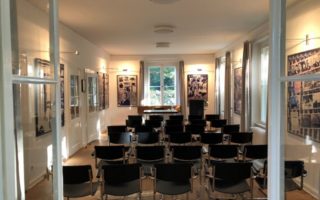Erinnerungs- und Begegnungsstätte Bonhoeffer-Haus
www.bonhoeffer-haus-berlin.de
________________________________________
Gottes Wege mit uns: „durch grüne Auen und durch das finstere Tal“ (Psalm 23)
________________________________________
TEXT
Gottes Wege sind die Wege, die er selbst gegangen ist und die wir nun mit ihm gehen sollen. Keinen Weg lässt uns Gott gehen, den er nicht selbst gegangen wäre und auf dem er uns nicht voranginge. Es ist der von Gott gebahnte und von Gott geschützte Weg, auf den er uns ruft. So ist es wirklich Sein Weg …
Mit Gott tritt man nicht auf der Stelle, sondern man beschreitet einen Weg. Es geht voran oder man ist nicht mit Gott. Gott kennt den ganzen Weg, wir wissen nur den nächsten Schritt und das letzte Ziel. Es gibt kein Stehenbleiben, jeden Tag, jede Stunde geht es weiter. Wer seinen Fuß auf diesen Weg gesetzt hat, dessen Leben ist eine Wanderschaft geworden. Er geht durch grüne Auen und durch das finstere Tal, aber der Herr wird ihn immer auf der rechten Straße führen (Psalm 23) und „er wird deinen Fuß nicht gleiten lassen (Psalm 121,3).
Die ganze Heilsbotschaft des Evangeliums kann als „der Weg“ schlechthin (Apostelgeschichte 19,9; 22,4; 24,14) oder als „Weg Gottes“ (Apostelgeschichte 18,25f.) bezeichnet werden. So wird es deutlich dass das Evangelium und der Glaube nicht eine zeitlose Idee, sondern ein Handeln Gottes und des Menschen in der Geschichte sind.
Dietrich Bonhoeffer, Meditation über Psalm 119 (Vers 3), 1939/1940, DBW 15, 507 f.
KONTEXT
Dietrich Bonhoeffer hat Psalm 119 besonders geliebt. Es ist der längste Psalm, kunstvoll gebaut mit Versanfängen, die dem hebräischen Alphabet folgen. Der Tora als dem von Gott offenbarten ‚Weg der Vollkommenheit‘ widerspricht die Lebensrealität mit den Erfahrungen von Unrecht, Lüge, Habgier, Gewalt, Frevel, Not, Kummer, Elend und Schande, aber auch Stillstand, wo es voran gehen müsste. In seinem Vertrauen birgt sich der Betende in der Schutzburg der Tora, der unerschütterlichen Weltordnung. In der betenden Meditation wird die Tora zum ‚Evangelium‘, der frohen Botschaft von Gottesgegenwart und Lebensfreude.
Psalm 23 beschreibt die schützende Gottesgegenwart und Lebensfreude mit der Metapher vom guten Hirten, der uns durch die Todschattenschlucht hindurch begleitet, und vom großzügigen Gastgeber, der uns im Angesicht der Feinde (ich verbinde damit konkrete Konflikte, Ängste, Bedrohungen) den Tisch deckt.
(Literatur: Erich Zenger, Stuttgarter Psalter. Mit Einleitungen und Kurzkommentaren, Katholisches Bibelwerk Stuttgart, 2005)
In existenzbedrohenden Krisen können wir die gewohnten Wege nicht mehr gehen. Wenn wir nur auf den eigenen Weg schauen, werden wir nicht aus der Not herausfinden. Die unterschiedlichen, auch widersprüchlichen Wegweisungen von allen Seiten verwirren uns. Worauf können wir vertrauen?
Museen beginnen bereits, Fundstücke aus der Zeit der Corona-Krise zu sammeln – für später.
Warum suchen wir nicht – für jetzt – nach den Fundstücken unseres Vertrauens, das uns durch frühere Krisen hindurch geleitet hat? Wir können so – ‚von hinten herein gesehen‘ – prüfen, ob und wie sie uns geholfen haben. Ob sie uns auch jetzt helfen können? Biblische Erzählungen, Gebete und Bekenntnisse sind solche Fundstücke. Dietrich Bonhoeffer ist davon überzeugt, dass es nicht nur auf unsere Wege, sondern auf Gottes Wege mit uns ankommt. Gott nimmt uns mit in die Zukunft. Das hebt unseren Blick über die nächsten Schritte hinaus und lässt uns jetzt an der Verwirklichung von Grundsätzen einer gerechteren und solidarischeren Gesellschaft betend und handelnd, verantwortlich und konkret mitwirken.
„Gottes Wege sind die Wege, die er selbst gegangen ist und die wir nun mit ihm gehen sollen.“
Christus, Hirte deines Volks,
leb mit uns, mach uns vertraut
mit des Vaters nahem Wort,
das uns trifft an unsrem Ort.
_______________________________________
Memorial and Place of Encounter Bonhoeffer-Haus Berlin
www.bonhoeffer-haus-berlin.de
So much strength to resist ! Read Bonhoeffer in critical times (5) April 26, 2020
_______________________________________
Ways with us: „through the lush pastures and through the dark valley“ (Psalm 23)
_______________________________________
TEXT
God’s ways are the ways that he has tread before and that we are to walk with him now. God does not allow us to walk a path that he has not walked before and on which he would not precede us. It is the way cleared by God and protected by God on which he calls us. This is truly His way …
With God, one does not just mark time but one walks along a path. Either one moves ahead or one is not with God. God knows the entire way; we only know the next step and the final goal. There is no standing still; every day, every hour, one progresses. The life of whoever has set his foot on this path has become a wandering. He walks through the lush pastures and through the dark valley, but the Lord will always lead him on the right path (Psalm 23) and “he will not let your foot be moved” (Psalm 121:3).
The entire gospel message of salvation can be called simply “the way” (Acts 19:9; 22:4; 24:14) or the “way of God” (Acts 18:25, 26). In this way it becomes clear that the gospel and faith are not a timeless idea but an action of God and of the human being in history.
Dietrich Bonhoeffer, Meditation on Psalm 119 (Vers 3), 1939/1940, DBW English Version, volume 15, 504.
CONTEXT
Dietrich Bonhoeffer particularly valued Psalm 119. It is the longest psalm, artistically arranged the letters at the beginning of the verse in the order of the Hebrew alphabet. The Torah as the ‚path of perfection‘ revealed by God contradicts the reality of life with the experiences of injustice, lies, greed, violence, wickedness, need, grief, misery and shame, but also standstill where it should go. In his trust, the praying person hides in the protective castle of the Torah, the unshakable world order. In the praying meditation, the Torah becomes the ‚gospel‘, the good news of the presence of God and the joy of life.
Psalm 23 describes the protective presence of God and joy of life with the metaphor of the good shepherd who accompanies us through the lush pastures and the Death Shadow Gorge and the generous host who sets the table for us in the face of the enemy (I associate it with specific conflicts, fears, threats).
Literatur: Erich Zenger, Stuttgarter Psalter. Mit Einleitungen und Kurzkommentaren, Katholisches Bibelwerk Stuttgart, 2005
We cannot go the usual ways in existential crises. If we only look at our own path, we will not find our way out of need. The different, even contradictory directions, that are offered to us from all sides confuse us. What can we trust?
Museums are already beginning to collect memorabilia from the time of the Corona crisis – for later. Why don’t we – for now – look for the memorabilia of our trust that have guided us through previous crises? In this way, we can check – seen from today – whether and how they helped us. Can they help us also now? Biblical stories, prayers and confessions are such memorabilia. Dietrich Bonhoeffer is convinced that it is not only our way that matters, but God’s way with us. God takes us into the future. This raises our view beyond the next steps and now allows us to pray, act, be responsible and concrete in the implementation of the principles of a fairer and more solidary society.
„God’s ways are the ways that he has tread before and that we are to walk with him now.“
Christ, shepherd of your people,
live with us, share with us
the Father’s word
that speaks to us in our lives.

